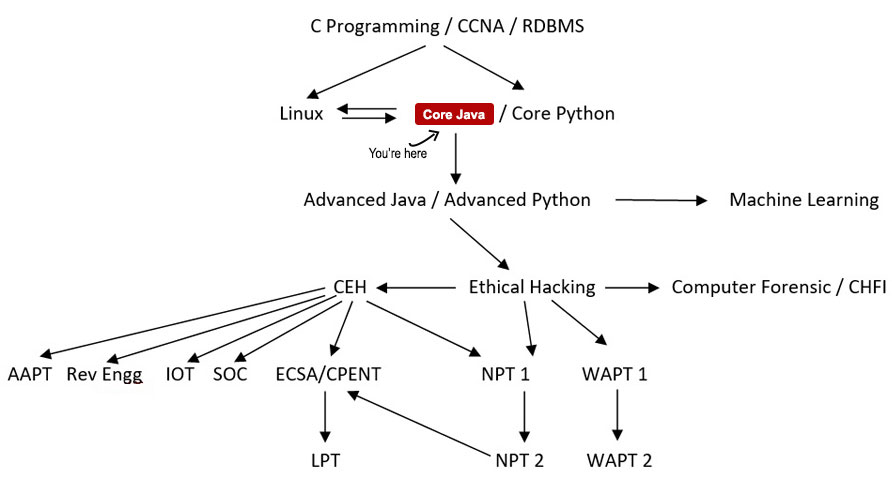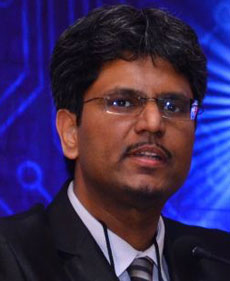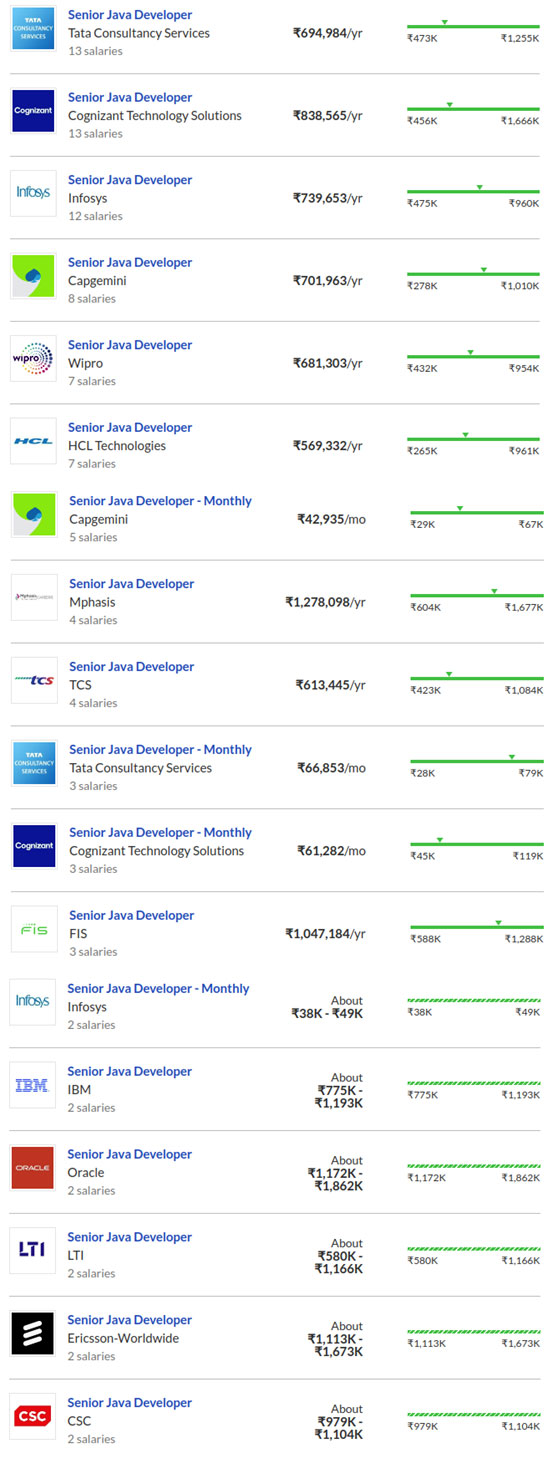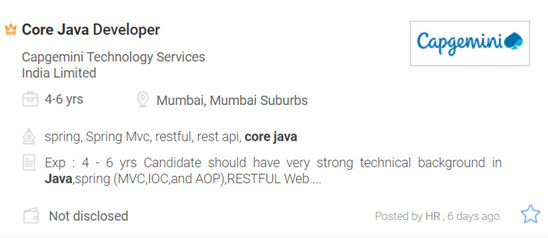This course is all about the entire programming language called Java. "Core Java" is Sun's term, used to refer to Java SE, the standard edition and a group of related technologies, like the Java VM, CORBA, etc. The course includes properties of Java, Constructor Concept, Encapsulation, Inheritance Concepts, Access Modifiers, Polymorphism, Scanner Class, Exception Handling, Thread Programming, GUI concepts, Connectivity, Java I/O, Java Strings, Java Swing.
Why Become A Core Java Developer?
Enables
Big Data Applications
(Hadoop)
Creates a clear concept about
OOP
(Object Oriented Programming)
Duration
40 hours - 2 classes per week
Eligibility
10+2 along with knowledge of C Programming & Database.
Course Fees
Class Room Training
Rs.8,750/-
Inclusive of all taxes
Online Training
Rs.18,750/-
Rs.8,750/-
Inclusive of all taxes
What You Will Get?
40 Hours
in-depth training by best faculties from software development industry
Study Materials
Core Java
Certificate of Completion after examination and alumni status
Your Course Path

Course Details
- The emphasis is on practical sessions more than theoretical.
- Why Java is called Platform Independent? (Explanation with practical Architecture)
- Methods and Variable types (Theory and 2 Examples)
- Data types with sizes (Theory and Example)
- Class, objects (Theory and 2 Examples)
- Method overloading (Theory and 3 Examples)
- What is Constructor (Theory and 2 Examples)
- Specification and Constructor Types (Theory and 1 Example each of Constructor types)
- Constructor Techniques(Constructor Overloading Copy Constructor) (Theory and 2 Examples)
- Advantages of Using Encapsulation in Java (Theory and 2 Examples)
- Advantages, features of Inheritance (Theory and 3 Examples)
- Method Overriding (Theory and 2 Examples)
- Discussion about Keywords (this, super, final, static ) (Theory and 2 examples each)
- Use of Access modifiers in Java Programming (Theory and 2 Examples of Default, Private, Public and Protected access modifiers)
- Types of Packages and its implementation (Theory and 2 Examples)
- Types and implementation in programming (Theory and 3 Examples)
- How to achieve abstraction in Java? (Theory and 2 Examples)
- Abstract keyword, Abstract Class, Interface (Theory and 3 Examples each)
- Importance of Scanner Class in Programming (Theory and 4 Examples)
- What is Exception and it's types (Theory and 3 Examples)
- Use of Java Exception Handling Keywords (try, catch, finally, throw, throws) (Theory and 2 Examples each)
- Advantages, Concept of Multithreading, Lifecycle (Theory and 2 Examples)
- Creating Thread, Thread Scheduler, Sleeping, joining a thread (Theory and 2 Examples each)
- Thread priority and synchronization (Theory and 2 Examples each)
- Java AWT, Event-Handling (Theory and 3 Examples each)
- Java Applet (Theory and 4 Examples each)
- Java Swing (Theory and 4 Applications each)
- Concepts of JDBC (Java Data Base Connection) (Theory)
- API (Theory)
- Interfaces (Theory)
- JDBC programming (3 Examples)
- Reading and Writing file and data/Object (Theory and 4 Examples)
- Serialization and De-Serialization (Theory and 2 Examples)
- Concepts of auto-boxing and un-boxing (Theory and 2 Examples)
- What is String? How to create String? (Theory and 3 Examples)
- Java String Buffer and String Builder (Theory and 5 Examples each)
- Implement Jdbc -Swing GUI Application to Store, Update, Delete and View the Employee Details (Emp_Id, Emp_Name, Emp_Address, Emp_DOB, Emp_Salary) (Front End- UI Designing in JFrame form and Back End: Java Coding and Database connection between Java and Oracle Database)
- Implement Registration Form GUI Application Using Java Swing(Front End- UI Designing in JFrame form and Back End: Java Coding) etc.
Hacking Tutorials
Read All Tutorials »
Building a career in Digital Forensics - How promising is the future? A thorough career guide
Read Details »Hacking Videos
Explore All Videos »How to Hiding Your Secret File using Steganography?
View On Youtube »Enroll Now
Fields marked with * are mandatory.
Ratings & Reviews
Job Prospects & Job Sources
A career for Java developers/programmers is replete with the following designations which one can be succeeded with.
| Web developer | Application developer | EJB programmer |
| Software developer | Tester | Graphic designer |
| A professional teacher in Java |
The average salary for a Java Developer is Rs.5,36,574 per year in India.
Here's a breakup of the pay scale as per companies in India at present.
FAQs
This course is all about the entire programming language called Java."Core Java" is Sun's term, used to refer to Java SE, the standard edition and a group of related technologies, like the Java VM, CORBA, etc. The course includes properties of Java, Constructor Concept, Encapsulation, Inheritance Concepts, Access Modifiers, Polymorphism, Scanner Class, Exception Handling, Thread Programming, GUI concepts, Connectivity, Java I/O, Java Strings, Java Swing.
The course lasts for 40 hours at 2 classes per week.
The emphasis is on practical sessions more than theoretical.
The general eligibility of the course is 10+2 along with knowledge of C Programming & Database.
Java has opened a new horizon for the IT sector. There are several fantastic products and services accessible by using Java. Java developers/programmers have an extensive part to play in revamping the IT market. Java extends its sway on everything from the mobility (i.e. Android) to the middleware (i.e. Hadoop) and hence has an escalating future.
The subsequent step after core java is advanced Java (Java web programming and Java database programming) and Android App Development.
Member of:










